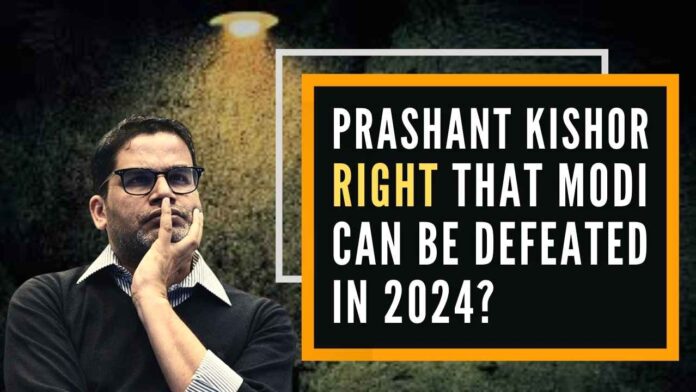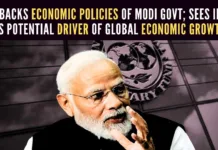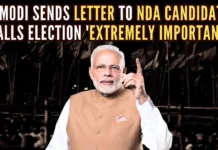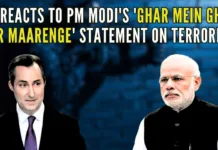
PK’s ambitions look like a pipe dream
Prashant Kishor (PK), in his interview to India Today on 15th March 2022, said Modi can be defeated, despite his and BJP’s dominance in Indian politics. Is this likely? Let’s discuss.
BJP, led by Modi, has won 4 of the 5 State elections, due significantly to better law and order and delivery of welfare schemes, esp to the poor and women voters. The bad caste and religious arithmetic of the opposition which mobilized the others against them also played a part.
Though the Vajpayee government had also successfully delivered on a lot of development, his projects were more at the societal level, like rural and urban infrastructure than at the individual level, and they failed to win the 2004 elections. This led BJP to think that development alone won’t win elections.
Apart from infrastructure projects and welfare schemes, Modi also gave importance to a moderate version of Hindutva to counter the pseudo-secularism of the opposition.
Despite the pains experienced by the people, esp the poor, due to demonetization, GST, COVID-19, and the UP-centric stray cattle menace caused by gau rakshak policies, most of the people realize Modi did all he did with the best of intentions, and so people have accepted the pains so far.
So there’s a broad feeling that Modi is likely to get another term as PM in 2024.
And the opposition, including PK, want to replace Modi ASAP. In any case, in the interest of democracy, we need a well-intentioned and strong opposition, even to get the best out of the Modi government.
So, we come to the question, “who is the most likely challenger to Modi in 2024?”, though PK dismisses this as less important.
The factors that lead to electoral success in Lok Sabha are quite complex.
A significant percent of people would want change, even without any reason. On top of this, there is a certain level of anti-incumbency.
With the growth of capital markets, technology, automation, AI, IOT, etc, the gap between the rich and the poor keeps widening in India (and across the world).
And there are also the other perceptional eternal factors that affect people, like inflation.
With increased education, esp for women, induction of women in just about every economic activity, etc, the percentage of annual unemployment keeps increasing, while we are not even able to address the existing levels of unemployment. There are no easy solutions to this problem.
So, a certain erosion in the vote share of BJP is inevitable.
How do people (or decision-makers, where decisions are made by local leaders) broadly decide who to vote for?
They assess who they want to win, and arrive at a pecking order. They also decide who they don’t want to win. If the party they want to win doesn’t have a reasonable chance of winning, they would vote to defeat the party they want to lose.
If Lok Sabha elections were held today, NDA is likely to have a vote share of around 40%, Congress around 15%, and the other regional parties 1 to 3% each.
Let us remember that Modi has the highest level of acceptability across India (more than 50% as it comes out in polls like the Mood of the Nation Poll, but acceptability may not translate into votes), and all other leaders are in single digits, way behind.
Due to local factors, even Modi supporters vote for more winnable parties (like in southern states) and may want a local party candidate (like BJD) to represent them. So, when some ‘intellectuals’ claim there are more people who oppose Modi than support him, they are displaying intellectual dishonesty.
Even in many of the key opposition ruled states, Modi has a strong enough vote base, and so, BJP’s seats in LS come not just from BJP ruled states, but even from opposition ruled states, like Rajasthan, Maharashtra, Odisha, West Bengal, and Jharkhand. But there are also states, esp in the South, where BJP draws almost a blank.
Congress’ significant but inadequate vote bank is scattered across the country. So, in the ‘first past the post’ system, their votes get them disproportionately fewer seats. NDA is in power in 18 states, and non-NDA Governments rule in 12 states, mostly dominated by regional parties. Congress rules or is a dominant partner only in 2 states.
BJP’s chances will be the highest as long as the Gandhis control Congress. And if they have anyone else at the helm, Congress will implode. So, Congress can’t become the alternative to BJP. But PK thinks Congress can reinvent itself from scratch, which looks like wishful thinking.
Some of the Opposition leaders also want to become the PM, by merely being lucky to be the chosen one among the opposition parties through pre-poll (and post-poll) alliances. None of them is willing to give away the PM’s position to anyone else, since their vote share would be almost as good as the others’. It is difficult to change their attitude.
Different opposition parties have high vote shares in different states. When multiple opposition parties get together in alliance, first of all, it is doubtful if their vote shares would add up state-wise to defeat BJP. For example, TMC doesn’t have any meaningful (anti-BJP) vote share anywhere outside West Bengal and Tripura to transfer to any alliance partners to make a difference. This is true of most opposition parties across India.
Even in states where the opposition could join hands, their votes may not always be easily transferable to their allies. For example, BSP’s votes won’t easily get transferred to SP. Shiv Sena’s votes won’t easily get transferred to its alliance partners. And so on.
Therefore, it appears that opposition in alliance also may not make a credible and winnable combination, though they can improve marginally.
Let’s see if AAP can become the alternative to NDA.
AAP can’t easily tie-up with most of the parties, pre-poll, because its main raison d’etre is, all other parties are corrupt and non-deliverers.
AAP is now in power in 2 states, Delhi (UT) and Punjab. Being relatively new without much baggage (except for accusations like Khalistani links), if AAP tries to spread its wings across India organically, AAP may garner a vote share of about 3-5%.
But, if AAP can convince at least the people in states where Congress is the ruling/ opposition party (Assam, Bihar, Chattisgarh, Goa, Gujarat, Haryana, HP, Karnataka, MP, Rajasthan, UP, and Uttarakhand) that AAP is a better alternative to BJP (which is not easy in the short term and may even end up splitting opposition votes), on paper, those who want to defeat BJP/ Modi may shift their votes from Congress to AAP. Since AAP doesn’t carry baggage like Congress, fence-sitters who are not exactly happy with BJP but vote for it in preference to Congress may vote for AAP.
But the opposition parties, even friendly ones like TMC, won’t cede ground to AAP so easily. They would like to occupy that space or sabotage AAP’s chances.
AAP is distinctly different from other political parties in the sense, its key decision-makers are young. Most of them come from professional backgrounds. They have found intelligent ways to do quick dipstick research to feel the pulse of the voters before elections to make election-winnable decisions, though they have proved this only on limited scales. They do have some, but limited mass appeal nationally.
AAP came to power in Delhi using the offer of freebies and guerilla warfare tactics. These may work in limited segments, not across the nation. AAP’s grassroots level workers are limited to very few places, and it would take many years to get and groom them. So, for AAP to emerge as a national alternative to BJP, it is likely to take at least a decade and a few more elections.
In politics, sometimes, unforeseen situations could arise and throw up unforeseen opportunities.
AAP’s hope is for such luck to emerge as the alternative. AAP itself was the product of an unforeseen Anna Hazare movement. I won’t put it beyond AAP to even engineer such unforeseeable situations, even if it’s by foul means, as they are good at modern guerilla warfare.
Funds will be a problem, but there are many foreign forces that want to defeat Modi at any cost, and they could fund AAP, directly or indirectly.
By design or default, the opposition could make it a 3 horse race, viz., NDA, AAP, and the third front of regional parties, with or without Congress. After the elections, AAP could have a post-poll alliance with the third front and Congress, and see if they could form a coalition government.
In my humble opinion, PK’s ambitions of building up Congress (esp with the Gandhis at the helm) as the core of the opposition, look like a pipe dream.
AAP doesn’t figure prominently in PK’s scheme of things, but the 3 horse race with BJP, AAP, and united opposition of other parties is the only option that could give the opposition the best fighting chance against BJP, if at all.
Note:
1. Text in Blue points to additional data on the topic.
2. The views expressed here are those of the author and do not necessarily represent or reflect the views of PGurus.
PGurus is now on Telegram. Click here to join our channel and stay updated with all the latest news and views
For all the latest updates, download PGurus App.
- How BJP can get 33%+ vote share in TN - April 1, 2024
- A transparent, equitable electoral funding alternative - March 19, 2024
- How TN BJP can come to No. 1 or No. 2 in 2024 LS polls - January 11, 2024











Well Prashant Kishor can do the mathematics part of it influence sloganeering during elections, but people of India Vote the way they chose to. Remember Mrs Indira Gandhi was defeated, but the same people reelected her later. The Villagers may be illustrate, poor but when it comes to elections despite money and muscle power they vote with a particular concious which is difficult to fathom.